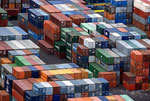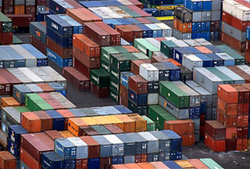 New York Times – Editorial: There has been a lot of talk, for a long time, about reining in Iran’s nuclear ambitions. Far too many countries have found Iran’s oil wealth simply too hard to resist. There are encouraging signs that for at least some major players, patience with Tehran may be running out.
New York Times – Editorial: There has been a lot of talk, for a long time, about reining in Iran’s nuclear ambitions. Far too many countries have found Iran’s oil wealth simply too hard to resist. There are encouraging signs that for at least some major players, patience with Tehran may be running out.
The New York Times
Editorial
 There has been a lot of talk, for a long time, about reining in Iran’s nuclear ambitions. Far too many countries have found Iran’s oil wealth simply too hard to resist. There are encouraging signs that for at least some major players, patience with Tehran may be running out.
There has been a lot of talk, for a long time, about reining in Iran’s nuclear ambitions. Far too many countries have found Iran’s oil wealth simply too hard to resist. There are encouraging signs that for at least some major players, patience with Tehran may be running out.
A week after the United Nations Security Council approved a fourth round of sanctions on Iran, the European Union adopted even tougher penalties. Japan, South Korea and Australia are expected to follow soon.
American sanctions on Iran — many dating from the 1979 Islamic Revolution — are already the most stringent in the world. But four years after the Security Council first ordered Iran to stop enriching uranium, Europe is still Iran’s biggest trading partner.
The latest Security Council sanctions are primarily focused on cutting off Iran’s access to the international financial system and ending dealings with the Islamic Revolutionary Guards Corps, which runs Iran’s illicit nuclear program and much more. The resolution still gives countries too much discretion. It calls on — rather than requires — states to close Iranian banks with any links to the country’s nuclear or missile programs. And it urges them to deny insurance coverage to Iranian shipping and other businesses with any links to proliferation.
At a meeting this week in Brussels, European heads of state adopted rules that could close many of those potential gaps and added more restrictions, banning European companies from making new investments in, or otherwise assisting, Iran’s oil and gas industry.
European ministers will now have to decide which Iranian companies are off limits and which European products and deals are affected. We are sure there will be considerable lobbying in Brussels by countries and companies to let favorites off the hook. The leaders need to instruct their ministers to hang tough.
That means closing all of Iran’s suspect banking operations in Europe and strictly limiting business between European and Iranian banks. It means banning all business with Islamic Revolutionary Guards Corps-affiliated entities (no matter how hard the Iranians try to disguise those links) and sanctioning European companies that violate this prohibition. It also means banning European companies from selling insurance services to any Iranian entities with ties to the Revolutionary Guards or the nuclear program.
European banks have been gradually weaning themselves from business with Iran, and industry giants like Siemens of Germany say they will make no new investments there. But Siemens also has insisted on fulfilling existing contracts, raising doubts about its sincerity.
Russia has played a cynical double game with Iran for far too long, watering down sanctions resolutions and then ignoring them. So we were — cautiously — encouraged when Prime Minister Vladimir Putin of Russia told France last week that Russia would freeze the planned delivery of S-300 air defense missiles to Iran. (American officials say that is not required under the United Nations sanctions.) We found it encouraging that the state oil company, Lukoil, has announced it is dropping an Iranian oil project. Those commitments will need to be closely monitored.
China — despite voting for all four rounds of sanctions — is increasing its investments in Iran. Washington, Moscow and Brussels all need to call Beijing out.
As it pressed its offer of engagement, the Obama administration intentionally downplayed possible punishments for Tehran. Iran’s leaders have responded with bluster and insults — all the while churning out more enriched uranium. On Wednesday, the White House blacklisted more than a dozen additional Iranian companies and individuals with links to Tehran’s illicit nuclear and missile programs.
Congress — rarely known for its subtlety on such matters — is working on its own, even tougher sanctions legislation. Details are still being negotiated, but it is expected to call for punishing foreign companies that sell refined gasoline to Iran and do other business there. At a time when Europe is finally putting some real pressure on Iran, any bill must be worded very carefully and give the White House sufficient waiver power.


